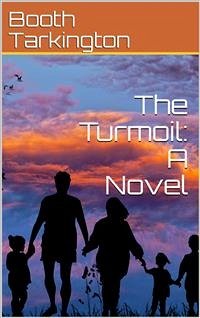“The Turmoil” by Booth Tarkington, was the first novel in what would become the “Growth” trilogy. Originally published in 1915, “The Turmoil” takes place in a fictional mid-west city which is never named, but which is probably modeled on Indianapolis. The name of the trilogy is appropriate, not only because these novels deal with the growth in the country, and the affect of industrialization on society, but also with Tarkington’s growth as a writer which appears to have come from his taking time off after writing “The Guest of Quesnay” and resulted in novels that were much fresher and more innovative. The focus of the novel is on the Sheridan family, which has recently come to wealth through the strong business practices of the father (James), who puts his business before everything else. Other members of the family are the weak wife, the eldest son James Jr. (i.e. Jim) - who is being groomed to replace his father, the middle child Roscoe - who is being treated like a runner-up, a daughter Edith - who is pushing to make the family part of society, and the youngest son Bibbs - who is a disappointment to his father, because he has a much different outlook on what is important in life. It is Bibbs who is the main character of the novel. Other key characters include Sibyl Sheridan – the wife of Roscoe, Bobby Lamhorn – the love interest of Edith, and Mary Vertreese, the daughter of the Vertreese family, which is an old and prestigious family in the area, but one which is keeping up appearances as they are almost without money. There are still some issues with the racial interaction between the Sheridans and their servants which some will find offensive. That being said, this novel doesn’t feel as dated as some of Tarkington’s other works, though it is clearly a piece representative of the period in which it was written. The challenges that face Bibbs, and the changes he goes through are like a mini-representation of the changes facing the country with the impact of industrialization. The transformation of Bibbs is an interesting one, and doesn’t follow the path one would expect. For a while, it looks as if Bibbs way of life would come out as the strongest, as tragedy and circumstances cause big changes in the Sheridan family. But Tarkington doesn’t allow things to be that easy, and instead Bibbs changes his ways to take on the role that his father needs. There is certainly sadness when Bibbs makes the break from his old interests, but his transformation is a strong one, and while he couldn’t have survived in this new life at the start of the novel, at the end he thrives. Another interesting aspect of the novel is the difference between the old prestigious family, the Vertreeses, and the new powerful and wealthy family, the Sheridans. The Vertreeses are trying to hide the desperate financial condition of their family, and the pairing of their daughter to James Sheridan Jr. is seen by Mr. and Mrs. Vertreese as a necessary evil to get them out of their difficulties. Initially Mary Vertreese is willing to go along with her role, but it is the impact that Bibbs has on her that changes her mind and has her change her mind. As the novel continues, it is clear that it is Mary and Bibbs that are drawn to each other, though they are not willing to admit it, especially Bibbs. Tarkington takes no position of what is right or wrong in the conflict between the old and the new, or the industrialization of society. He treats it as simply a change which is inevitable and one which is going to have impact on society and the family.
Bitte wählen Sie Ihr Anliegen aus.
Rechnungen
Retourenschein anfordern
Bestellstatus
Storno









